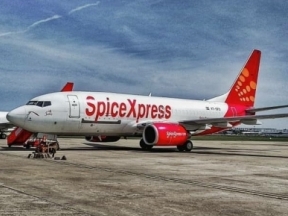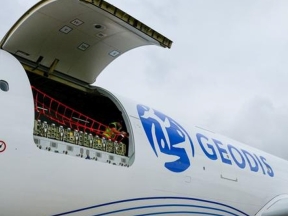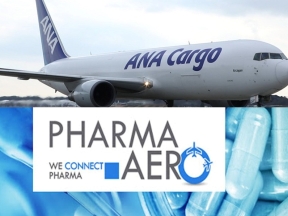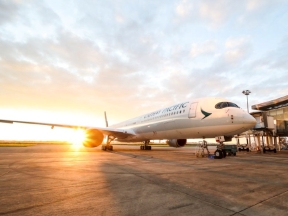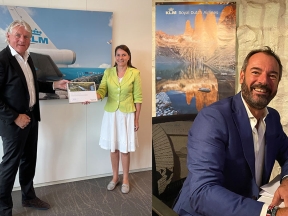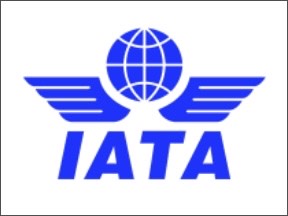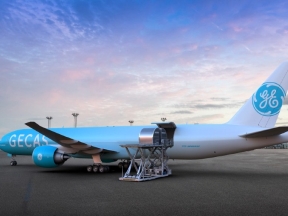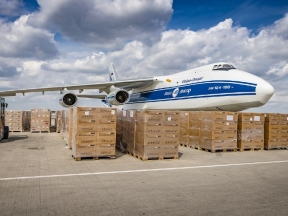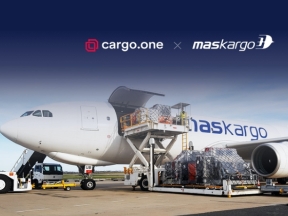SpiceJet shared that it has received the approval of stakeholders to transfer its cargo and logistics services business to a subsidiary. The transfer will be on a slump sale basis, through an all-share deal worth over INR 2,555 crore, a move is aimed at helping the airline to significantly reduce its negative net worth. In a release, the budget carrier said it has received shareholders’ approval to transfer the cargo and logistics services business to its subsidiary, SpiceXpress and Logistics Private Ltd. According to the airline, the transfer will provide greater and differentiated focus to cargo and logistics business as well as allow raising capital for the business to accelerate its growth. Also, the shareholders have cleared the proposal to raise up to INR 2,500 crore through the Qualified institutional placement (QIP) route. These developments also come at a time when the airline industry is slowly recovering after being battered by the coronavirus pandemic.
Read More »GEODIS to start service between Europe and Asia
GEODIS, a global leading transport and logistics services provider, is extending its AirDirect service with the addition of a twice weekly flight routed London Stansted (STN)/Amsterdam (AMS)/ Hong Kong (HKG)/STN/AMS. GEODIS will in part use its new A330-300 full freighter aircraft to operate this rotation between Europe and Asia. From October, GEODIS’ APAC customers will have access to almost 80 percent of European destinations within 24 hours. This new investment underscores the company’s enhanced focus on the APAC region and its commitment to serve a greater range of business verticals in Asian markets. As manufacturing in Asia continues to be the backbone of several key European business sectors, the requirement for exporters to secure reliable and well-priced freight forwarding services has become even more critical through the disruption brought about by the Covid-19 outbreak. The new route launch comes on the heels of the introduction of GEODIS’ Shanghai to Guadalajara flight in March this year, which has improved cargo connectivity to the West Coast of the Americas. GEODIS also continues with its dedicated service from Hong Kong to Guadalajara.
Read More »ANA Cargo joins Pharma.Aero for end-to-end air transportation of pharma cargo
ANA Cargo has joined Pharma.Aero, a non-profit organization with its headquarters in Brussels, Belgium, family as a full member to exchange and build market knowledge and expertise. “Pharma.Aero continues to pursue its vision in achieving reliable end-to-end air transportation of pharma cargo by expanding its global network and inviting more stakeholders across the pharma air supply chain in our collaborative projects. In the near term, we wish to jointly forge quality pharma trade lanes and develop new standards and guidelines”, said Nathan De Valck, chairman, Pharma.Aero. Dai Yuasa, senior vice president of global marketing, ANA Cargo added, “We are very honored to join Pharma Aero, which brings together top global pharma companies, pharma hub airports, airlines and forwarders that focus on pharmaceuticals. We are looking forward to making further contributions to the pharma air transport sector. ANA has been focusing on the air transport of pharmaceuticals. In 2017, ANA became the first Japanese airline to obtain CEIV PHARMA certification. Under current COVID-19 situations, air transport plays a more significant social role in the transportation of vaccines, therapeutic drugs and PPEs. At the same time, we have to consider sustainability issues. It is important that we continuously improve our services such as temperature, time and container management to maintain the quality of each pharma shipment. By participating in Pharma.Aero, ANA hopes to learn and co-operate with those who are leading the pharma air transportation, so that we can deliver pharma products to the world with higher quality service.”
Read More »Cathay Pacific releases August 2021 traffic figures
Cathay Pacific released its traffic figures for August 2021 that continued to reflect the airline’s substantial capacity reductions in response to significantly reduced demand as well as travel restrictions and quarantine requirements in place in Hong Kong and other markets amid the on-going global Covid-19 pandemic. The airline carried 124,278 tonnes of cargo and mail last month, an increase of 21.7percent compared to August 2020, but a 23 percent decrease compared with the same period in 2019. The month’s revenue freight tonne kilometres (RFTKs) rose 20.7 percent year-on-year, but were down 15.4 percent compared to August 2019. “While August is traditionally a quieter month for cargo due to the summer holiday period in the Northern Hemisphere, this was not the case this year and demand continued to be buoyant both from our home market, Hong Kong, and from across our network. Cargo capacity increased about 9 percent month-on-month, reaching approximately 66 percent of our August 2019 pre-pandemic levels,” said chief customer and commercial officer Ronald Lam.
Read More »SpiceXpress inaugurates airport based Free Trade Zone Warehouse at Hyderabad airport
SpiceXpress is creating unique propositions in the Indian Logistics field by inaugurating the first of its kind Airport Based Free Trade Zone Warehouse in GMR Hyderabad international Airport, Telengana. At a time when India and the state of Telengana in specific is looking forward to promote the export and import of goods and help the manufacturers and traders boost their business we at SpiceXpress have taken the initiative of creating the Free Trade Zone at GMR Hyderabad International Airport, which is the right solution. A free-trade zone (FTZ) is a class of special economic zone. It is a geographic area where goods may be imported, stored, handled, manufactured, or reconfigured and re-exported under specific customs regulation and generally not subject to customs duty. “Most of our free trade zones are on the sea port side helping the manufacturers and traders who use the sea mode. Manufacturers and traders using Air mode, specifically Pharma, E Commerce, Aero Space, Perishables, etc had logistical challenges using these free trade zones. We at SpiceXpress are the first ones to set up a Free Trade Zone (FTZ) Warehouse on the Airport Side.”said Sanjiv Gupta, CEO, SpiceXpress
Read More »Air France KLM Martinair Cargo partners with Total Touch Cargo for SAF programme
Air France KLM Martinair Cargo (AFKLMP Cargo) and Total Touch Cargo Holland BV (TTC) join hands within the framework of the airline’s sustainable aviation fuel programme. Under the partnership, AFKLMP Cargo will use sustainable aviation fuel (SAF) on selected cargo flights from Nairobi – Kenya to Amsterdam Airport Schiphol, carrying TTC’s fresh agricultural and horticultural products. Cargo CEO/owner Harry van der Plas was at the AFKLMP Cargo headquarters at Schiphol to sign the formal documents. The agreement includes a fixed annual investment from Total Touch Cargo that will allow AFKLMP Cargo to further expand development and procurement of SAF. TTC’s contribution will be used to cover the cost differential between conventional aircraft fuel and SAF.
Read More »lATA’s World Cargo Symposium to take place in Dublin
With just weeks to go until one of the biggest events for the air cargo sector, IATA’s World Cargo Symposium has now moved to Dublin. The symposium will take place at the Convention Centre Dublin, from October 12-14. The three-day event had originally been scheduled to take place in Istanbul but due to difficulties in travelling to and from Turkey, it has now been moved to Dublin. “IATA’s World Cargo Symposium is moving to Dublin, Ireland,” the airline association said on its website. “Dublin is picturesque, historic, and filled with stories at every turn. We had hoped to bring you to Istanbul, but circumstances changed.” The event had originally been scheduled to take place in Istanbul in March 2020 but was later rescheduled due to the outbreak of covid-19. The symposium has become the largest annual event in the air cargo calendar, attracting more than 1,000 attendees and 40 exhibitors.
Read More »Boeing sees huge potential for P2F over next 2 decades
Replacement of aging airplanes and freighters in-demand for e-commerce and other services is likely to create a demand for 2,610 freighters in the next two decades, according to the new Boeing Commercial Market Outlook. “Of these, 890 planes will be production freighters. The remaining 1,720 freighters are forecast to be passenger-airplane conversions. The freighter fleet will increase by 70 percent from 2,010 airplanes in 2019 to 3,435 airplanes by 2040,” the report said. Air cargo traffic declined 9 percent in 2020 following a 3 percent decline in 2019 due to the economic downturn and disruptions caused by the pandemic, Boeing said in its statement. “Air cargo traffic is now above 2019 levels. Accelerated e-commerce growth, supply chain disruptions, and severe maritime challenges are contributing to a robust air cargo market recovery.”
Read More »Leipzig/Halle Airport annual freight volume exceeds 1 mn tonne in August
The volume of freight handled at Leipzig/Halle Airport (LEJ) reached the figure of 1,025,187 tonnes and already exceeded the 1 million mark in the month of August since the beginning of the year. This represents an increase in the amount of cargo of 18.4 percent compared to the same period in the previous year. Approximately 125,050 tonnes were processed at the airport in August alone this year. That represents an increase of 15.1 percent in comparison with the same month in the previous year. The total amount of freight handled in the previous year set a new record at more than 1.38 million tonnes. The number of air cargo flights rose by 25.8 percent to more than 40,000 during the first eight months of the year. Leipzig/Halle Airport is one of the cargo airports with the dynamic growth rates in the world. LEJ is the first airport in Germany to have registered more flights in August than before the Covid-19 crisis (August 2019).
Read More »MASkargo and cargo.one announce global partnership
As part of its digitalization agenda, MASkargo, a Malaysian Cargo Airline, has entered into a distribution agreement with e-booking platform cargo.one. The aim is to bring a smooth digital booking experience to MASkargo’s customers and to expand its presence in key cargo markets. “At MASkargo, our strategy is to deliver a first-class customer experience by way of a continuous innovative digital solutions cycle. We are delighted to partner with cargo.one to augment our domestic digital offering to a premium global presence by bringing our real-time rates and capacities to this innovative and rapidly growing online booking platform”, Mark Jason Thomas, chief commercial officer at MASkargo, explains.
Read More » Cargo Breaking News
Cargo Breaking News
